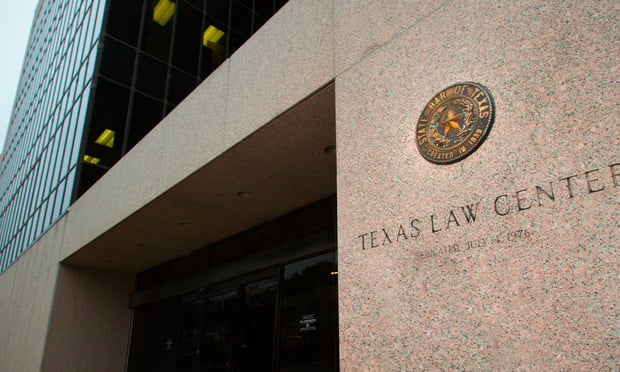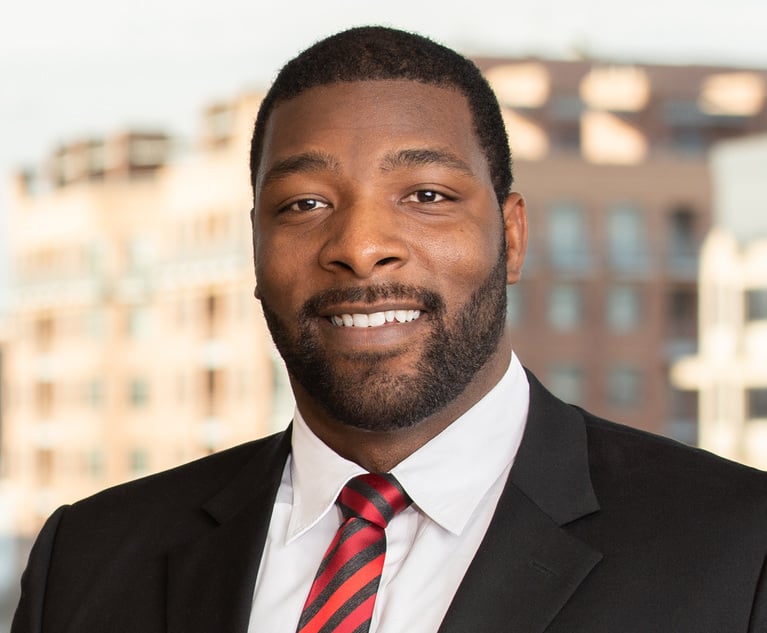Texas Bar Board Pledges Action to Erase Systemic Racism, Boost Diversity After Marathon Meeting Over Larry McDougal's Comments
The board of directors of the State Bar of Texas created two new groups to research action to erase systemic racism in the bar and promote diversity and inclusion, and asked bar committees to study two specific proposals that came from public comments.
July 28, 2020 at 02:32 PM
6 minute read
 The State Bar of Texas, Austin. (Photo: ALM)
The State Bar of Texas, Austin. (Photo: ALM)
In a marathon board meeting on Monday, the State Bar of Texas voted to take action to start healing divisions in the bar in the wake of online comments by President Larry McDougal.
During the 12-hour Zoom meeting, McDougal pledged to present his plan to address the offense given to many minority attorneys and allies from his words, but the bar board indicated it wouldn't sit idly by and wait on him.
Bar leaders created two new groups to research how to erase systemic racism in the bar and promote diversity and inclusion in the legal profession, and also asked bar committees to start a deeper study on two specific proposals that came from public comments in the meeting.
McDougal said at the meeting that he has been working to put a plan together of the actions that he will take to heal the division from his online comments. He has met twice with the bar's African American Lawyers Section and talked with bar directors about implicit bias training for lawyers and other programs to launch, he said.
"My goal and where I'm going with this is to do better—to move our bar in a different direction," McDougal said. "What can we do that is different? Things that will work? Things that will be inclusive, things that will bring people together? Those things do not happen overnight."
He said he is gathering his ideas so that he can present a plan that is the best it can be. McDougal said he would address what has happened, "not run from it."
"I want to lead this bar. I stuck my foot in my mouth, and I know it. I don't deny it," McDougal said. "I have my blindness. That's probably why I did that, because I didn't see. But I have learned a lot."
McDougal must come up with a preliminary plan by Sept. 24 under a proposal that the bar board passed unanimously.
McDougal seconded a motion by Randy Sorrels, immediate past president of the bar, to set a deadline for McDougal to present a preliminary plan to the board about "how he intends to address the division that has occurred over the last 17 days," Sorrels said. Under the motion, McDougal would have to present his idea by Sept. 24 and then set his plan in place by the January 2021 board meeting.
Sorrels accepted an amendment by Director Steve Fischer that said the board would have discretion to extend McDougal's deadline for the preliminary plan, if McDougal's health issues required more time.
McDougal recently underwent cancer surgery, according to an email by his spokeswoman, Christine Haas.
Working group and task force
The board also voted to take action on a new task force and working group that will study ideas that came from the controversy over McDougal's comments.
The board unanimously passed a proposal by President-elect Sylvia Borunda Firth to create a task force on diversity, equity and inclusion. She said that something bad brought the board together for the meeting, but now there's been a good result: they have recommitted themselves to the work of diversity and inclusion. The task force will follow the words with action, said Firth, who pledged to dedicate her year as president to the issue.
"There is a will to make positive steps in the right direction," Firth said. "Let's get started."
Unanimous approval also followed a motion by directors Carmen Roe and Adam Schramek to create a working group of board members who will review all of the written and oral public comments that were submitted for the meeting, discuss recommendations for action by the bar, and identify any potential legal issues that must be analyzed. The working group will report back to the board about the proposals that the bar should adopt, or ideas that need more discussion.
Later in the meeting, Firth also moved successfully to ask legal counsel to identify potential legal precedent that would apply to recommendations for action by the African American Lawyers Section and the National Bar Association.
Implicit bias training and anti-discrimination rule
Two of the recommendations by public speakers in the meeting will move forward to be studied by bar committees now.
The board unanimously passed a motion by Director Jason Smith to request the bar's Minimum Continuing Legal Education Committee to consider adding an implicit bias training course to each lawyer's annual CLE requirements. Under the motion, the committee will have to report a recommendation to the bar board at its January 2021 meeting. The board also voted to approve a motion by Director Lucy Forbes that all directors take implicit bias training before the end of 2020.
Later in the meeting, Smith proposed a motion to request the bar's committee on disciplinary rules and referenda to consider whether to adopt American Bar Association model rule 8.4(g), which would prohibit attorneys' discriminatory conduct in all areas of the practice of law, rather than just in adjudicatory proceedings, as under the current Texas rules. His motion passed unanimously.
Another proposal that the board approved by Schramek requires two bar committees to study how to improve the vetting process for future president-elect candidates, and find ways to make sure lawyers get better information on candidates before voting.
Fischer, the sole no vote on the vetting proposal, said he didn't oppose vetting candidates regarding racist statements, but he was afraid the vetting process would be used to ask candidates if they are "pro bar and against reform."
"Who is going to stop them from saying, 'We want to vet people who say the bar is great, and there is nothing they do wrong," Fischer said. "I'm against it."
Related stories:
Lawyers Call On Texas Bar President to Resign Over Black Lives Matter Comments
McDougal Must Go? Directors Call for Texas Bar President's Ouster Amid #BLM Controversy
Amid Controversy, Texas Minority Lawyers Call for Action Against Racism in Profession
'Shame Is Not Strong Enough': Texas Bar Meeting Sees 61 Speakers Line Up to Address Larry McDougal's Online Comments
Bar Director Proposes Stripping Larry McDougal of His Texas Bar Spokesman Role
This content has been archived. It is available through our partners, LexisNexis® and Bloomberg Law.
To view this content, please continue to their sites.
Not a Lexis Subscriber?
Subscribe Now
Not a Bloomberg Law Subscriber?
Subscribe Now
NOT FOR REPRINT
© 2025 ALM Global, LLC, All Rights Reserved. Request academic re-use from www.copyright.com. All other uses, submit a request to [email protected]. For more information visit Asset & Logo Licensing.
You Might Like
View All
State Bar Ethics Opinion Determines Texas Lawyers Can't Join a Firm With Non-Lawyer Partners
2 minute read
Jones Day Names New Practice Leaders for Antitrust, Business and Tort Litigation and Latin America


Haynes and Boone Expands in New York With 7-Lawyer Seward & Kissel Fund Finance, Securitization Team
3 minute readTrending Stories
- 1Orrick Picks Up 13-Lawyer Tech, VC Group From Gunderson Dettmer
- 2How Alzheimer’s and Other Cognitive Diseases Affect Guardianship, POAs and Estate Planning
- 3How Lower Courts Are Interpreting Justices' Decision in 'Muldrow v. City of St. Louis'
- 4Phantom Income/Retained Earnings and the Potential for Inflated Support
- 5Should a Financially Dependent Child Who Rejects One Parent Still Be Emancipated?
Who Got The Work
J. Brugh Lower of Gibbons has entered an appearance for industrial equipment supplier Devco Corporation in a pending trademark infringement lawsuit. The suit, accusing the defendant of selling knock-off Graco products, was filed Dec. 18 in New Jersey District Court by Rivkin Radler on behalf of Graco Inc. and Graco Minnesota. The case, assigned to U.S. District Judge Zahid N. Quraishi, is 3:24-cv-11294, Graco Inc. et al v. Devco Corporation.
Who Got The Work
Rebecca Maller-Stein and Kent A. Yalowitz of Arnold & Porter Kaye Scholer have entered their appearances for Hanaco Venture Capital and its executives, Lior Prosor and David Frankel, in a pending securities lawsuit. The action, filed on Dec. 24 in New York Southern District Court by Zell, Aron & Co. on behalf of Goldeneye Advisors, accuses the defendants of negligently and fraudulently managing the plaintiff's $1 million investment. The case, assigned to U.S. District Judge Vernon S. Broderick, is 1:24-cv-09918, Goldeneye Advisors, LLC v. Hanaco Venture Capital, Ltd. et al.
Who Got The Work
Attorneys from A&O Shearman has stepped in as defense counsel for Toronto-Dominion Bank and other defendants in a pending securities class action. The suit, filed Dec. 11 in New York Southern District Court by Bleichmar Fonti & Auld, accuses the defendants of concealing the bank's 'pervasive' deficiencies in regards to its compliance with the Bank Secrecy Act and the quality of its anti-money laundering controls. The case, assigned to U.S. District Judge Arun Subramanian, is 1:24-cv-09445, Gonzalez v. The Toronto-Dominion Bank et al.
Who Got The Work
Crown Castle International, a Pennsylvania company providing shared communications infrastructure, has turned to Luke D. Wolf of Gordon Rees Scully Mansukhani to fend off a pending breach-of-contract lawsuit. The court action, filed Nov. 25 in Michigan Eastern District Court by Hooper Hathaway PC on behalf of The Town Residences LLC, accuses Crown Castle of failing to transfer approximately $30,000 in utility payments from T-Mobile in breach of a roof-top lease and assignment agreement. The case, assigned to U.S. District Judge Susan K. Declercq, is 2:24-cv-13131, The Town Residences LLC v. T-Mobile US, Inc. et al.
Who Got The Work
Wilfred P. Coronato and Daniel M. Schwartz of McCarter & English have stepped in as defense counsel to Electrolux Home Products Inc. in a pending product liability lawsuit. The court action, filed Nov. 26 in New York Eastern District Court by Poulos Lopiccolo PC and Nagel Rice LLP on behalf of David Stern, alleges that the defendant's refrigerators’ drawers and shelving repeatedly break and fall apart within months after purchase. The case, assigned to U.S. District Judge Joan M. Azrack, is 2:24-cv-08204, Stern v. Electrolux Home Products, Inc.
Featured Firms
Law Offices of Gary Martin Hays & Associates, P.C.
(470) 294-1674
Law Offices of Mark E. Salomone
(857) 444-6468
Smith & Hassler
(713) 739-1250






